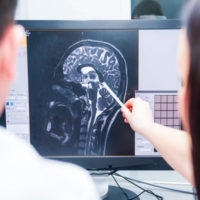Effects of Traumatic Brain Injuries
August 27, 2019 The Centers for Disease Control and Prevention (CDC) defines a traumatic brain injury (also known as a TBI) as a disruption in the brain’s normal functions usually caused by a blow, bump, or jolt to the head, or a penetrating head injury.
The Centers for Disease Control and Prevention (CDC) defines a traumatic brain injury (also known as a TBI) as a disruption in the brain’s normal functions usually caused by a blow, bump, or jolt to the head, or a penetrating head injury.
Traumatic brain injuries impact people’s lives in a variety of serious – and sometimes permanent – ways. Workers in certain industries as well as children and older adults all face higher risks for sustaining TBIs, though they are usually preventable.
General Information on Traumatic Brain Injuries
The CDC calls traumatic brain injuries a “serious public health concern”, citing thousands of avoidable, though often permanent, injuries in addition to deaths each year. Out of the agency’s estimated three million TBIs annually, it says nearly one-third of the deadly injuries occur in children.
Data Shows there are several leading causes of traumatic brain injuries, including:
- Falls (falls are the leading cause of TBIs in adults over 75-years-old);
- Transportation accidents, such as car accidents;
- Assaults, and;
- Sports-related accidents
Falls in the workplace are also a leading cause of traumatic brain injuries in adults. Depending on how serious a person’s traumatic injury may be, the repercussions can range from mild-to-severe. Even less serious traumatic brain injuries can cause permanent effects, along with major changes in the brain’s normal functioning.
TBIs impact people’s lives because they alter a variety of the brain’s normal characteristics and in turn, its abilities. Traumatic brain injuries affect:
- Speech and language;
- Mobility;
- Memory;
- Physical and psychological activities, and:
- Consciousness
Symptoms of Traumatic Brain Injuries
There are two main, different types of traumatic brain injuries: closed head injuries and open head injuries. In an open head injury, the skull is fractured or there is a breach of the brain’s protective membranes. Closed head injuries, however, do not cause involve skull fractures and often inflict less catastrophic effects.
After a penetrating head injury, or a blow, jolt, or bump to the head, there are certain important signs to look out for. Some of the most common symptoms of traumatic brain injuries include:
- Confusion, memory loss, and loss of consciousness;
- Headache;
- Blurred vision;
- Dizziness;
- Seizures and paralysis, and:
- Coma
If you sustained a head injury and experience any of the symptoms above, please contact a health professional or call 9-1-1 immediately.
Because traumatic brain injuries can happen in a variety of ways, it is sometimes advisable to discuss the questions you may have with an attorney. For example, if an employer’s failure to implement effective and reliable safety measures in the workplace results in an employee getting hurt, he or she may be able to file a workers’ compensation claim.
When someone is injured because of another’s negligence, filing a legal claim can help provide peace of mind during a stressful and scary time. If you would like to speak with a lawyer about your traumatic brain injury, please contact a representative at our firm directly.
Philadelphia Workers’ Compensation Lawyers at Galfand Berger, LLP Represent Individuals Injured at Work
If you were injured at work, please contact our Philadelphia workers’ compensation lawyers. With offices located in Philadelphia, Bethlehem, Lancaster, and Reading Galfand Berger serves clients throughout Pennsylvania and New Jersey. To schedule a consultation, call us at 800-222-8792 or complete our online contact form.
 Google Screened
Google Screened
